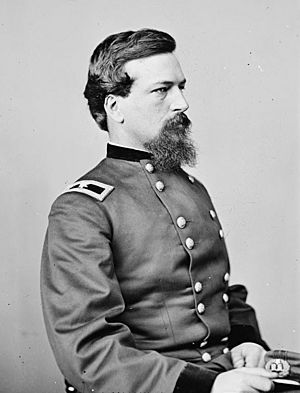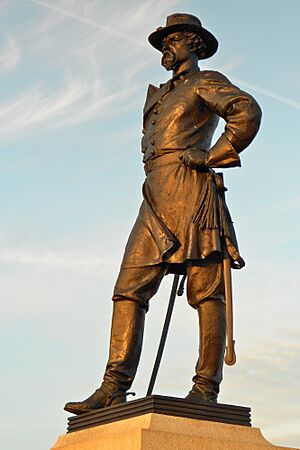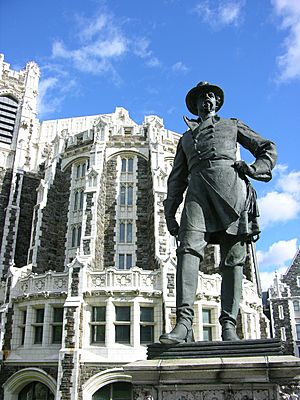Alexander S. Webb facts for kids
Quick facts for kids
Alexander Stewart Webb
|
|
|---|---|
 |
|
| 2nd President of City College of New York | |
| In office 1869–1902 |
|
| Preceded by | Horace Webster |
| Succeeded by | John Huston Finley |
| Personal details | |
| Born | February 15, 1835 New York City, New York |
| Died | February 12, 1911 (aged 75) Riverdale, Bronx, New York |
| Resting place | West Point Cemetery |
| Spouse |
Anna Elizabeth Remsen
(m. 1855) |
| Relations |
|
| Children | 8, including Alexander Stewart Webb Jr. |
| Parent | James Watson Webb (father) |
| Residence | Beechwood |
| Alma mater | United States Military Academy |
| Awards | Medal of Honor |
| Military service | |
| Allegiance | United States (Union) |
| Branch/service | U.S. Army (Union Army) |
| Years of service | 1855–1870 |
| Rank |
|
| Commands |
|
| Battles/wars | |
Alexander Stewart Webb (February 15, 1835 – February 12, 1911) was an important officer in the United States Army. He was a general for the Union Army during the American Civil War. He earned the Medal of Honor for his bravery at the Battle of Gettysburg. After the war, he became the president of the City College of New York for 33 years.
Contents
Early Life and Family History
Alexander Webb was born in New York City on February 15, 1835. He came from a well-known family with a strong history of military service. His father, James Watson Webb, was a former army officer. He also owned a newspaper and worked as a diplomat.
Alexander's grandfather, Samuel Blatchley Webb, was a hero in the American Revolutionary War. He was hurt at the Battle of Bunker Hill. He also worked for George Washington, who was the first U.S. President. This family history meant Alexander grew up with a strong sense of duty.
Military Career Beginnings
Alexander Webb went to Colonel Churchill's Military School. Then, he attended the U.S. Military Academy at West Point. He graduated in 1855, ranking 13th in his class.
After West Point, he became a second lieutenant. He was sent to Florida to serve in the Seminole Wars. Later, he returned to West Point to teach mathematics.
Serving in the Civil War
When the Civil War started, Webb helped defend Fort Pickens in Florida. He was also at the First Battle of Bull Run. He worked as an assistant to General William F. Barry. Barry was in charge of artillery for the Army of the Potomac.
During the Peninsula Campaign, Webb helped create a very strong artillery defense. This happened during the Battle of Malvern Hill. General Daniel Butterfield said that Webb saved the Union Army from being destroyed.
Webb was promoted to lieutenant colonel. He served as chief of staff for the V Corps. This was during the Maryland Campaign and the Battle of Antietam. In January 1863, he became chief of staff for the V Corps again. This time, it was led by General George Meade.
During the Battle of Chancellorsville, Webb temporarily led a brigade. He did very well in battle. President Abraham Lincoln made him a brigadier general on July 1, 1863.
Bravery at Gettysburg
Just before the Battle of Gettysburg, Webb took command of the Philadelphia Brigade. This was the 2nd Brigade, 2nd Division, II Corps. At first, his soldiers didn't like their new, very neat commander. But Webb soon earned their respect. He was friendly, disciplined, and paid close attention to details.
On July 2, 1863, Webb's brigade was on Cemetery Ridge. They fought off an attack by Confederate soldiers. They chased the Confederates back and captured about 300 men. Webb also sent help to fight another Confederate attack on Cemetery Hill.
On July 3, Webb's brigade was right in the middle of the Union line. They had to defend against Pickett's Charge. This was a huge attack by Confederate infantry. As Confederate cannons fired, Webb stood calmly in front of his men. He leaned on his sword and smoked a cigar. Cannonballs flew by, but he refused to hide. His bravery impressed his soldiers.
When Confederate soldiers got very close, some of Webb's men started to fall back. Webb shouted for his other soldiers to charge forward. He even tried to grab a flag to lead them himself. Webb was shot in his leg and groin, but he kept fighting. With help from other Union regiments, Webb and his men stopped the Confederate attack. They caused many injuries to the enemy.
Webb received the Medal of Honor on September 28, 1891. This award was for his "distinguished personal gallantry." It recognized how he led his men forward during a very important moment at Gettysburg.
Later War Service
After Gettysburg, Webb led a division for a short time. His division played a key role in the Battle of Bristoe Station. In May 1864, during the Battle of Spotsylvania Court House, he was shot. The bullet went through his eye and out his ear. Luckily, it did not harm his mind. News even reported he had been killed, but it was false.
He returned to the army in January 1865. He served as chief of staff for the Army of the Potomac. He left the volunteer army on January 15, 1866. He was later promoted to brevet major general in the regular army.
Life After the War
General Webb stayed in the Army until 1870. During his last year, he taught again at West Point. He left the army on December 5, 1870. His final rank was lieutenant colonel.
From 1869 to 1902, General Webb was the second president of the City College of New York. He followed Horace Webster, who was also a West Point graduate. Under Webb, the college taught both classic subjects like Latin and Greek. They also taught practical subjects like chemistry, physics, and engineering.
Webb was also a founder of the Military Order of Foreign Wars in 1894. He was a member of other military organizations too.
Personal Life
On November 28, 1855, Webb married Anna Elizabeth Remsen. They had eight children together. Their children included Helen Lispenard Webb and Alexander Stewart Webb Jr..
Alexander Webb died in Riverdale, New York, on February 12, 1911. He is buried in West Point National Cemetery.
Legacy
Alexander Webb wrote a lot about the Civil War. His book, The Peninsula: McClellan's Campaign of 1862, was published in 1881.
There is a bronze statue of him at Gettysburg Battlefield. It looks out over the area where Pickett's Charge happened. Another statue of General Webb stands on the campus of the City College of New York.
Colonel Charles S. Wainwright, a friend, called Webb "one of the most conscientious, hard working and fearless young officers." General Meade's aide, Theodore Lyman, said Webb was "jolly and pleasant." He also thought Webb was a "thorough soldier, wide-awake, quick, and attentive to detail."
See Also
|



